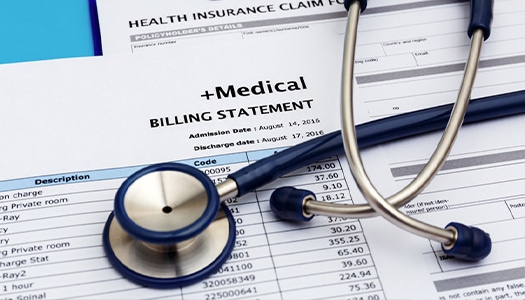The Health Consumer Alliance is here to help you understand your medical bills and whether you can reduce your debt. You may not owe the full amount. It is important to understand your rights with medical debt and how to enforce those rights.
While Inland Counties Legal Services only serves Riverside and San Bernardino Counties, the Health Consumer Alliance serves all of California and will connect you with a local organization that can help. Call the Health Consumer Alliance at (888) 804-3536 to see if you are eligible for assistance.
Hospital Debt
Hospital debt can be complicated. A bill from an emergency room visit or hospital stay may involve charges from different providers, such as the hospital itself, doctor groups, and lab testing companies. We can help you understand your rights and possibly help you apply for programs to reduce or cancel your debt.
If you want free help with a hospital bill, you can call the Health Consumer Alliance at (888) 804-3536.
In California, there are limits to how much hospitals can charge patients. California hospitals must provide free or discounted care to patients who are uninsured or have high medical costs, and have incomes below 400% of the Federal Poverty Level. This free or discounted care is commonly known as charity care or financial assistance. These requirements come from the Hospital Fair Pricing Act. Some hospitals in California go beyond the minimum requirements of the Hospital Fair Pricing Act and provide financial assistance to patients who have higher income limits and for catastrophic cases. There are also other state and federal laws that limit how much hospitals can charge some patients.
The bottom line is: hospitals are supposed to lower your bills if you cannot afford to pay.
Despite existing laws that protect patients from unaffordable hospitals bills, patients continue to get unlawful bills. A hospital may not offer a financial assistance application to patients when it is required. Or, a hospital may send bills without clear information about how to apply for financial assistance. Sometimes patients call a billing office for help and are steered toward payment plans instead of programs that would fully cover their bills.
Patients may apply for free or discounted care at any time, no matter where they are in the collections process. A hospital should not deny a patient’s application based on it being “late.” The law says hospital MUST accept and process your application no matter when you submit it.
Each hospital should have their financial assistance policy and application posted on their website in an easily visible location. You can also find their policies and applications on the website of the Department of Health Care Access and Information.
If you want free help with a hospital bill, you can call the Health Consumer Alliance at (888) 804-3536.
Ambulance Debt
Many Californians are shocked by the high cost of their ambulance bills. Ambulance bills include charges from ground and air transportation services that result from 911 emergency calls, transport between hospitals, and transport from hospitals back home. People usually cannot choose which ambulance company picks them up.
People who have Medi-Cal should never get or have to pay ambulance bills. If they get bills, it usually just means the ambulance provider does not have their Medi-Cal information.
However, people who have Medicare with or without a Medicare health plan can also get stuck with bills when Medicare refuses to pay.
People with commercial health insurance, such as through an employer or through Covered California, may get bills for “out of network” transportation. The problem is that most ambulance providers are not part of health insurance networks. As a result of not being part of health insurance networks, ambulances can charge the patient for the part of the bill that insurance does not pay.
If you want free help with an ambulance bill, you can call the Health Consumer Alliance at (888) 804-3536.
Dental Debt
Dental insurance often does not cover all the cost of dental treatment that people need. For many Californians, this leads to signing up for credit cards and other types of loans at dental offices to pay for these costs.
Dentists must follow certain rules before signing up patients for credit cards, credit lines, or loans:
- Dentists must provide patients with a written treatment plan and estimated cost of each service.
- Dentists must tell the patient how much a patient’s insurance plan will cover for each service or that a particular service is not covered by insurance.
- Patients must receive the contract or loan information in a language that they understand.
- Patients must not already be under the influence of anesthesia when they are asked to sign the credit or loan paperwork.
- The requirements for dental credit cards and loans are in Business and Professions Code Section 654.3.
People who have Medi-Cal should have all their medically necessary dental services covered, without cost and without an annual benefit maximum. But, it is common for patients with Medi-Cal coverage to still get bills from dental offices and to be persuaded to sign up for dental credit cards and loans. It is unlawful for dental providers to bill Medi-Cal patients for Medi-Cal covered services.
If you want free help disputing your dental credit card bill or loan amount, you can call the Health Consumer Alliance at (888) 804-3536.
Debt Collection
The Health Consumer Alliance can provide free legal representation or help with self-representation at all stages of medical debt cases. If you want free help with a medical debt collections matter, call the Health Consumer Alliance at (888) 804-3536.
If you have been sued for medical debt, please contact us right away. You may have only 30 days to file an answer to the lawsuit. If you do not answer within 30 days, the debt collector may get a judgment against you, meaning the court could issue an order that you owe the debt without an opportunity for you to fight it.
Possibly. You may continue to try to reduce or eliminate your medical debt even if you have a judgment against you. You may not have known a lawsuit was filed against you or maybe the debt was never yours to begin with. Each situation is unique.
If you find out you have a judgment against you and you would like help understanding your options, call us right away. In California, debt collectors can add both attorney’s fees and costs and a 5–10% interest rate on top of the original amount billed for medical services. Judgments involving medical debt in California can last for 10 years and be renewed. The terms of renewal depend on the amount of the debt. The longer the judgment lasts, the more you may end up being responsible to pay.
Debt collectors sometimes place liens on homes to collect on a judgment. It is important to protect your equity since your home may be the greatest asset you have. If you have a lien on your home due to medical debt, call us for help to understand your options.
If you want free help with a medical debt collections matter, call the Health Consumer Alliance at (888) 804-3536.
Seniors age 60 or over, call our Direct Senior line at
(800) 977-4257.
We’re here to Help
ICLS Continues to serve you remotely.
Fill out this application to determine if we can help you. If you have a short deadline, please call (888) 245-4257 for assistance.


